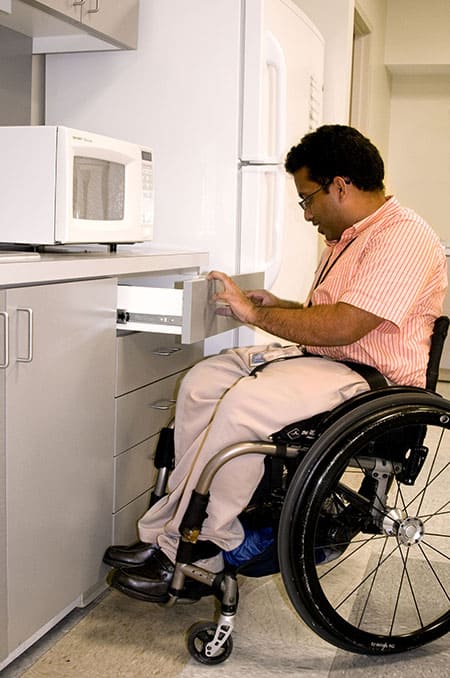Prize-winning ideas sought on future of accessible design to meet disabled people’s needs

Habinteg has announced its 50th anniversary essay competition on the future design of accessible homes and neighbourhoods.
After 50 years of pioneering accessible homes and communities, Habinteg is seeking the next generation of minds to innovate the world of access and inclusion, backed by the technical expertise of its specialist team, the Centre for Accessible Environments (CAE).
The winning entry will get a £2,500 cash prize with £500 on offer for the runner up. The winner will also have the opportunity to take up a week-long placement with the CAE.
Throughout 2020, Habinteg is marking 50 years providing and promoting accessible homes and neighbourhoods. As part of the celebration, Habinteg is running an anniversary essay competition to consider what the next 50 years of accessible and inclusive homes and neighbourhoods might be like.
Having started out in 1970, the housing association has grown with, and responded to, many changes in disabled people’s needs and expectations. Among other milestones, the association helped develop the Lifetime Homes Standard and developed and published successive editions of the Wheelchair Housing Design Guide.
Habinteg is now enriched with the expertise of the CAE – also 50 years old – as its technical consultancy team. CAE’s work broadens the association’s impact beyond the home and out into the public realm, workplaces, public transport and leisure environments.
The Habinteg 2020 Prize competition is open to both people with a lived experience of disability and those with an academic interest in the topic. Disabled people are particularly encouraged to enter, as well as students of subjects such as disability studies, architecture, occupational therapy or inclusive design.
The competition is sponsored by the Borwick Charitable Trust whose chair, Lord Jamie Borwick, will lead the judging panel. Lord Borwick’s long-standing commitment to removing barriers for disabled people includes the drive to ensure that all London taxis are wheelchair accessible.
He said: “We’ve seen a lot of positive change over the last 50 years that has broken down some of the disabling barriers that restrict so many people’s lives. Yet there are still many places that are inhospitable to large numbers of disabled people, not least the majority of our homes which were built before accessible design was thought about.
“We need to keep up the pressure to improve and it’s vital that we keep an eye to the future. We’re facing significant demographic change as well as changes in the nature and severity of individual impairments. This competition is a great opportunity to uncover some truly visionary ideas for the accessible homes and communities of the future.”
The competition runs from the 13th of January 2020 with the closing date for entries on the 27th of April.
Habinteg’s CEO Sheron Carter commented: “We’re delighted to be promoting this competition to mark Habinteg’s 50th Anniversary in collaboration with the Borwick Charitable Trust.
“With our proud history of work in the forefront of accessible design for homes and communities, we know that disability is a result of the environment around us rather than inherent to any individual person’s impairments. So it’s critical that as a society we continue to innovate and respond to changes in disabled people’s needs as well as exploring all the opportunities that come through development of aspects such as technology and engineering and construction.
“I’m really looking forward to seeing some exciting new ideas come forward as part of the competition.”
The winning entry will be announced at a 50th anniversary celebration reception in Parliament in the summer of 2020.
To enter the competition, click here
Habinteg is a leading national provider of affordable accessible homes and support services.
The Centre for Accessible Environments (CAE) has been a leading authority on inclusive design for 50 years. It provides consultancy, training, research and publications on building design and management to meet all user needs, including disabled and older people.

